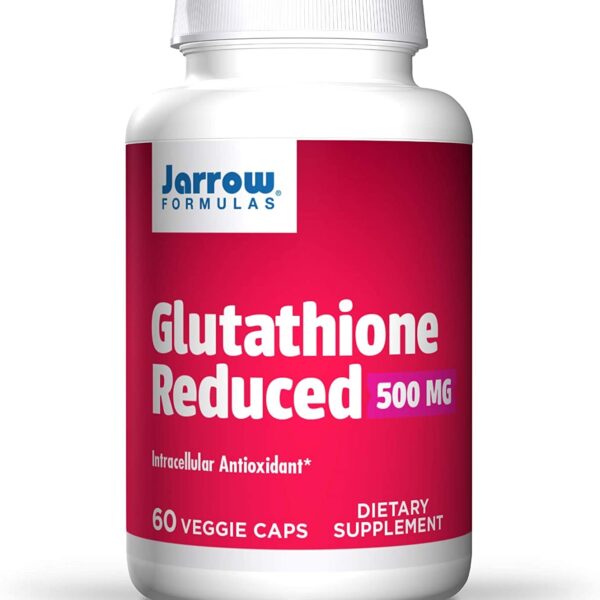-
Fast Shipping By HolioCare
-
Secure Payment Checkout
-
Low Returns Rate
 Health & Wellness
Health & Wellness
 Beauty & Skin
Beauty & Skin
 Bath & Personal Care
Bath & Personal Care
 Sport & Weight
Sport & Weight
 Pet’s Care
Pet’s Care
 Gifts
Gifts
 Electronics & Gadgets
Electronics & Gadgets
 Help With
Help WithHurry and get discounts on all products up to 20%
$34.99 – $86.99
Payment Methods:
Jarrow Formulas Glutathione Reduced delivers 500 mg of glutathione per capsule. Glutathione is the most abundant intracellular thiol (i.e., a compound with a sulfhydryl group) and low molecular weight tripeptide found in living cells. Tripeptide includes glycine, cysteine, and glutamate. The antioxidant functions of glutathione include recycling vitamin E and C and serving as an antioxidant in all types of tissues.* A low ratio of reduced vs oxidized glutathione is used as a measure of cellular toxicity.
Glutathione is a tri-peptide that the body utilizes to balance the redox potential of cells.
Produced in a pharmaceutical grade, non-oxidized form. .
Glutathione (GSH) is a tri-peptide composed of the amino acids glycine, cysteine, and glutamate. As one of the primary protective molecules in the body it is found, inside and outside of cells, in all tissues and body fluids. GSH is most highly concentrated in the liver, spleen, kidney, eye-lens, erythrocytes, and leukocytes. Higher glutathione status and/or dietary intakes have been correlated with cardiovascular, oral and eye health, as well as increased vitality with aging.*
The best food sources of glutathione are fresh fruits and vegetables and newly prepared meats. Since most methods of food processing destroy glutathione, the excessive intake of processed foods may be leading to modern diets that are often devoid of glutathione. Studies evaluating dietary intake from food have found wide variations amongst individuals: 3-250 mg/day (mean: 35 mg/day). Additionally, body-stores tend to decrease with age and even fluctuate throughout the day.
Since GSH is a peptide, many assume that it is completely digested by enzymes in the intestines. Further fueling this assumption, early studies did not find an appreciable increase in plasma levels after GSH ingestion. However, it now appears that GSH’s uncommon linkage amongst the glutamate side-chain and the cysteine residue makes GSH partially resistant to common peptide cleavage enzymes. This not only impacts its digestion, but also its regulation inside the body. Numerous studies have now demonstrated that oral glutathione is bioavailable and that blood levels may stay relatively constant even as tissue levels rise.
Oral glutathione feeds bodily tissues via three routes 1) absorption intact in the intestines followed by tissue uptake from blood, 2) degradation to its constituent amino acids in the GI tract, cellular absorption, then intracellular GSH re-synthesis, and 3) terminal passage into cells that line the GI tract. The availability of L-cysteine is the bottleneck for glutathione synthesis in the body, since cysteine is the least prevalent of glutathione’s three constituent amino acids in the diet. This is one reason N-acetylcysteine (NAC) is also used to support glutathione levels. Overall, there are about 15 grams of GSH in the body, of which roughly four grams can be found in the liver.
GSH is the major endogenous antioxidant produced by the body, possessing a substantial reduction-oxidation (i.e. “redox”) potential. Thus it can participate both directly and indirectly in the neutralization of free radicals and reactive oxygen species. It also helps maintain levels of exogenous antioxidants, such as vitamins C and E, in active forms. And of course, GSH is a cofactor for the enzyme glutathione peroxidase, which primarily protects the body from oxidative damage.*
GSH is added to lipophilic toxins, waste and xenobiotics in the liver during phase-2 detoxification to make them water-soluble and allow excretion from the body. As one example, GSH is necessary for the detoxification of methylglyoxal, a toxin produced as a by-product of human metabolism and thought to be a source of advanced glycation end-products (AGEs).* GSH is also necessary to avoid acetaminophen toxicity. In fact, GSH levels are often intentionally bolstered in cases of overdose. GSH keeps the acetaminophen metabolite NAPQI from binding to thiol groups of cellular proteins and causing cell-death.
The ratio of reduced glutathione to oxidized glutathione within cells is often used as a measure of cellular toxicity. In healthy cells and tissue, more than 90 percent of the total glutathione pool is in the reduced form (GSH) and less than 10 percent exists in the disulfide form (GSSG). An increased GSSG-to-GSH ratio is considered indicative of oxidative stress and sometimes tissue dysfunction. Besides a poor diet, other lifestyle factors like smoking cigarettes, excessively consuming alcohol and chronically taking medications can alter the GSSG-to-GSH ratio. If your G-ratio needs work, try Jarrow FORMULAS Glutathione Reduced.
No wheat, no gluten, no soybeans, no dairy, no egg, no fish/shellfish, no peanuts/tree nuts.
Take 1 capsule per day with a meal or as directed by your qualified health care consultant.
Jarrow Formulas’ complete line of over 350 nutritional products includes vitamins, minerals, probiotics, standardized herbal concentrates, amino acids, enzymes and enteral nutrition products. Customers can be assured of purity, value and potency when choosing these products.
Jarrow Formulas Reduced Glutathione, 500mg, 60 Capsules.
In stock
Out of stock
Available on backorder
Out of stock
Out of stock
 Health & Wellness
Health & Wellness
 Beauty & Skin
Beauty & Skin
 Bath & Personal Care
Bath & Personal Care
 Sport & Weight
Sport & Weight
 Pet’s Care
Pet’s Care
 Gifts
Gifts
 Electronics & Gadgets
Electronics & Gadgets
 Help With
Help With
No account yet?
Create an Account
Reviews
Clear filtersThere are no reviews yet.